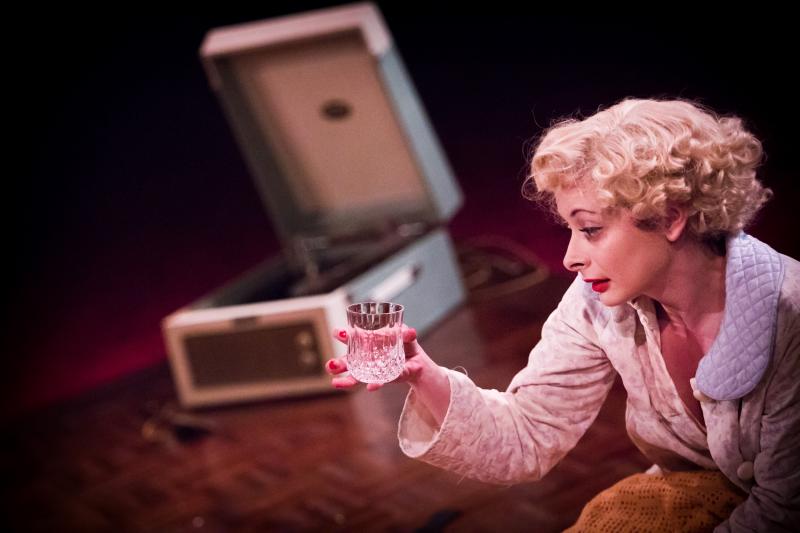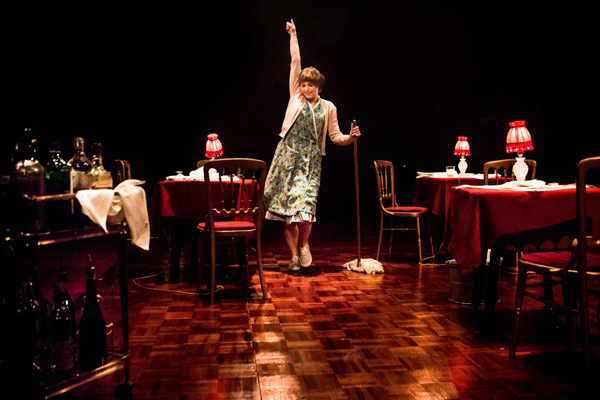The Thrill of Love, St James Theatre | reviews, news & interviews
The Thrill of Love, St James Theatre
The Thrill of Love, St James Theatre
Amanda Whittington’s account of Ruth Ellis, last woman to be hanged in Britain, evokes a lost world

Ruth Ellis, the last woman to be hanged in Britain, is a cultural icon, the image of the peroxide blonde who spells big trouble. An influence on Diana Dors in the 1956 film Yield to the Night, she was played by Miranda Richardson in Dance with a Stranger in 1985. Last year, a new biography, Carol Anne Lee’s A Fine Day for a Hanging, was published. Now, playwright Amanda Whittington tracks down this fraught and troubling figure.
First the facts: by the time Ellis met the racing driver David Blakely in 1953, she already had a young kid, born when she was 17, and had quit a violent marriage to an older divorced dentist. Now, after a career as a model and nightclub hostess, she was managing a nightclub. Neither she nor Blakely were faithful during their affair. After he walked out, she shot him dead and gave herself up to the police. Her trial lasted less than two days. She was executed on 13 July 1955. She was 28 years old.
Why did Ellis show absolutely
no remorse?
Whittington’s play attempts to answer some of the nagging questions behind this apparently cut-and-dried case. Why did Ellis plead not guilty but offer no defence? Why did she show no remorse? And just who was she trying to protect? The good news is that the playwright has successfully connected to the emotional answers to these questions. And her appealing way into the story is the introduction of a narrator, Detective Inspector Jack Gale, who is our guide for the evening.
Gale introduces us to the rather seedy world of London nightclubs, with their hostesses and dodgy clientele. Whittington hints at links with the notorious Cliveden set, which about half a decade later was involved in the Profumo scandal. But the body of the play shows us the female friendships at the heart of Ellis’s story. We meet Sylvia Shaw, a nightclub manager, Vickie, a model, and Doris the char.
 It’s the 1950s, and their relationship is deftly set in the context of the emerging celebrity culture. All the women immerse themselves in the blues of Billie Holiday, showing how — right from the start — pop music offered a vision of glamour while at the same time providing consolation. The clubs might be tawdry, but the women working in them have dreams and fantasies.
It’s the 1950s, and their relationship is deftly set in the context of the emerging celebrity culture. All the women immerse themselves in the blues of Billie Holiday, showing how — right from the start — pop music offered a vision of glamour while at the same time providing consolation. The clubs might be tawdry, but the women working in them have dreams and fantasies.
Whittington captures the fierce protectiveness of these working-class women, their cheerfulness in adversity, which survives their bitchiness and petty jealousies. At the same time, behind their hard exteriors these are vulnerable youngsters, with chronically low self-esteem. Ellis is obsessed with her lover Blakely, but her passionate and jealous scenes conceal a massive neediness. Her feelings spill out in a binge of alcohol and self-destructiveness.
And we are not spared Ellis’s suffering, her ectopic pregnancy and her lover’s violent outbursts are graphically shown. Apart from Gale, however, there are no men on stage. This is a story about women. It is also a very discrete reading of Ellis's life story — there is no mention of child abuse or bad sex. It avoids clichés and, in James Dacre’s confident production, matches some great frocks with both girly silliness and images of female friendship. Amid the tragedy, there's a sense of fun.
If none of the actors have the real steel of 1950s women, Faye Castelow is a reasonably convincing Ellis, and she is well supported by Hilary Tones (Shaw), Katie West (Doris, pictured above) and Maya Wasowicz (Vickie). Robert Gwilym is Gale. The production, which opened at in Newcastle-under-Lyme, evokes an atmospheric world, partly tacky, but partly appealing. But its real strength lies in its emotional truth and its warm sympathy.
rating
Buy
Share this article
Add comment
The future of Arts Journalism
You can stop theartsdesk.com closing!
We urgently need financing to survive. Our fundraising drive has thus far raised £49,000 but we need to reach £100,000 or we will be forced to close. Please contribute here: https://gofund.me/c3f6033d
And if you can forward this information to anyone who might assist, we’d be grateful.

Subscribe to theartsdesk.com
Thank you for continuing to read our work on theartsdesk.com. For unlimited access to every article in its entirety, including our archive of more than 15,000 pieces, we're asking for £5 per month or £40 per year. We feel it's a very good deal, and hope you do too.
To take a subscription now simply click here.
And if you're looking for that extra gift for a friend or family member, why not treat them to a theartsdesk.com gift subscription?
more Theatre
 Deaf Republic, Royal Court review - beautiful images, shame about the words
Staging of Ukrainian-American Ilya Kaminsky’s anti-war poems is too meta-theatrical
Deaf Republic, Royal Court review - beautiful images, shame about the words
Staging of Ukrainian-American Ilya Kaminsky’s anti-war poems is too meta-theatrical
 Laura Benanti: Nobody Cares, Underbelly Boulevard Soho review - Tony winner makes charming, cheeky London debut
Broadway's acclaimed Cinderella, Louise, and Amalia reaches Soho for a welcome one-night stand
Laura Benanti: Nobody Cares, Underbelly Boulevard Soho review - Tony winner makes charming, cheeky London debut
Broadway's acclaimed Cinderella, Louise, and Amalia reaches Soho for a welcome one-night stand
 The Pitchfork Disney, King's Head Theatre review - blazing with dark energy
Thrilling revival of Philip Ridley’s cult classic confirms its legendary status
The Pitchfork Disney, King's Head Theatre review - blazing with dark energy
Thrilling revival of Philip Ridley’s cult classic confirms its legendary status
 Born with Teeth, Wyndham's Theatre review - electric sparring match between Shakespeare and Marlowe
Rival Elizabethan playwrights in an up-to-the-minute encounter
Born with Teeth, Wyndham's Theatre review - electric sparring match between Shakespeare and Marlowe
Rival Elizabethan playwrights in an up-to-the-minute encounter
 Interview, Riverside Studios review - old media vs new in sparky scrap between generations
Robert Sean Leonard and Paten Hughes make worthy sparring partners
Interview, Riverside Studios review - old media vs new in sparky scrap between generations
Robert Sean Leonard and Paten Hughes make worthy sparring partners
 Fat Ham, RSC, Stratford review - it's Hamlet Jim, but not as we know it
An entertaining, positive and contemporary blast!
Fat Ham, RSC, Stratford review - it's Hamlet Jim, but not as we know it
An entertaining, positive and contemporary blast!
 Juniper Blood, Donmar Warehouse review - where ideas and ideals rule the roost
Mike Bartlett’s new state-of-the-agricultural-nation play is beautifully performed
Juniper Blood, Donmar Warehouse review - where ideas and ideals rule the roost
Mike Bartlett’s new state-of-the-agricultural-nation play is beautifully performed
 The Gathered Leaves, Park Theatre review - dated script lifted by nuanced characterisation
The actors skilfully evoke the claustrophobia of family members trying to fake togetherness
The Gathered Leaves, Park Theatre review - dated script lifted by nuanced characterisation
The actors skilfully evoke the claustrophobia of family members trying to fake togetherness
 As You Like It: A Radical Retelling, Edinburgh International Festival 2025 review - breathtakingly audacious, deeply shocking
A cunning ruse leaves audiences facing their own privilege and complicity in Cliff Cardinal's bold theatrical creation
As You Like It: A Radical Retelling, Edinburgh International Festival 2025 review - breathtakingly audacious, deeply shocking
A cunning ruse leaves audiences facing their own privilege and complicity in Cliff Cardinal's bold theatrical creation
 Edinburgh Fringe 2025 reviews: Refuse / Terry's / Sugar
A Ukrainian bin man, an unseen used car dealer and every daddy's dream twink in three contrasting Fringe shows
Edinburgh Fringe 2025 reviews: Refuse / Terry's / Sugar
A Ukrainian bin man, an unseen used car dealer and every daddy's dream twink in three contrasting Fringe shows
 Faustus in Africa!, Edinburgh International Festival 2025 review - deeply flawed
Bringing the Faust legend to comment on colonialism produces bewildering results
Faustus in Africa!, Edinburgh International Festival 2025 review - deeply flawed
Bringing the Faust legend to comment on colonialism produces bewildering results
 Edinburgh Fringe 2025 reviews: Imprints / Courier
A slippery show about memory and a rug-pulling Deliveroo comedy in the latest from the Edinburgh Fringe
Edinburgh Fringe 2025 reviews: Imprints / Courier
A slippery show about memory and a rug-pulling Deliveroo comedy in the latest from the Edinburgh Fringe

Comments
The play's OK, will be a
Sorry, should have said